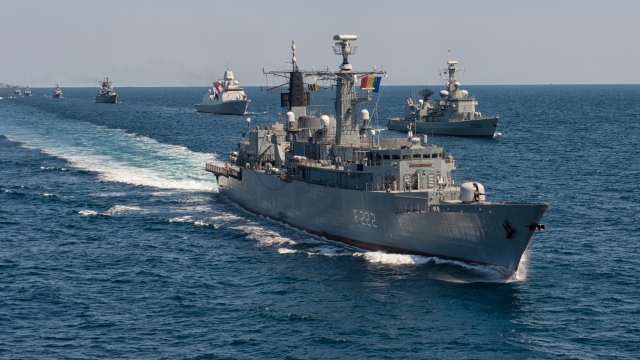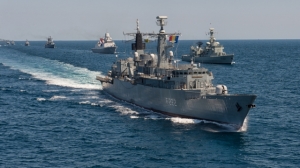Creation of NATO Black Sea Fleet Gains US Support
SOFIA, Bulgaria – NATO Deputy Secretary-General Alexander Vershbow said at the weekend the United States strongly supports a proposal by Turkey, Bulgaria and Romania to expand the Western military alliance's maritime presence in the Black Sea rapidly to deter Russia’s increasingly hostile actions towards its neighbors, international news agency Reuters reported Sunday.
"There are some very valuable discussions under way among our allies who live around the Black Sea ... to more closely integrate their naval forces and operations," said Vershbow. "We need to consider a more robust and persistent NATO military presence in the region, with a particular focus on our maritime capabilities."
NATO’s renewed drive to bolster its naval presence in the region is meant to counter Russia’s rapid militarization of Crimea, a strategic peninsula in the north of the Black Sea that Moscow invaded and illegally annexed from Ukraine in March 2014.
Moscow has deployed thousands of military units to the peninsula in the two years since the annexation, including elite naval infantry brigades, air force fighter-bomber wings, as well as missile boats and surface fleet personnel that are positioned to tip the regional strategic balance in Russia’s favor.
Russian President Vladimir Putin has in recent months openly spoken of the possibility that he could re-deploy his strategic nuclear rocket forces to Crimea in the event Russia’s national interests come under increased threat from either Western-led economic sanctions or political pressure from the half dozen other nations that border the Black Sea.
Russia’s seizure of Crimea and the outbreak of full-scale war in Ukraine’s eastern Donbass Region shook NATO’s East European members.
Two years of fighting, which pits regular Russian troops and their pro-Moscow proxies against Ukrainian government forces, has cost 10,000 lives and left more than a million as refugees.
Strategic NATO members Poland, Bulgaria and Romania, believe Russia plans to launch a similar-style operation against the tiny Baltic States of Estonia, Latvia and Lithuania by fomenting unrest in the countries’ large Russian-speaking minority populations.
Western governments hope to bolster NATO’s defensive capabilities on its eastern flank without provoking the Kremlin by permanently stationing large deterrent forces in the region.
NATO officials say their proposal for a NATO Black Sea fleet envisages a broad cooperation with alliance aspirants Georgia and Ukraine.
"The formula for creating a naval force is open to our key partners Georgia and Ukraine, though they aren’t currently a part of the alliance, as well as to NATO members who don’t border the Black Sea…namely, the United States," Romanian Defense Minister Mihnea Motoc said in a recent interview.
Backed by a massive increase in US military spending, NATO has begun setting up a force rotation system, as well as regular large-scale war games and elite rapid response units aimed at deterring any Russian moves that could destabilize the region.
The new force includes air, naval and special operations units numbering up to 40,000 combat and support personnel.
US Defense Department officials have, in recent weeks, expressed their belief that Russia is actively implementing a potentially effective strategy aimed at blocking NATO’s ability to patrol freely the air, sea and ground security perimeters belonging to its constituent members.
Their concerns heightened on April 11 when a Russian Su-24 fighter simulated an attack on the USS Donald Cook, an American Navy destroyer that was sailing in international waters in the Baltic Sea.
Five days later, the US’ European Central Command, which oversees military operations throughout Europe, said that a Russian fighter-interceptor flew within 15 meters of a reconnaissance aircraft and performed “a series of provocative manoeuvres” aimed at intimidating the American pilots.
Army General Curtis Scaparrotti, NATO’s next Supreme Allied Commander and head of the US European Central Command, testified before a Senate nomination hearing on April 21, saying he supports stationing a permanent brigade-sized of 4,500 US combat troops in Eastern Europe to deter Russia’s actions.
“I think the Russians are pushing the envelope regarding our resolve and in terms of international law. From a purely military perspective, we should sail and fly wherever we are allowed by international law…we should be strong, clear, and consistent in our message in that regard," Scaparrotti said. “I personally believe that a permanently stationed armored brigade in Eastern Europe would be best, It gives us a little more substance and a little more strength in terms of relationship building with our key allies.”
By Nicholas Waller












